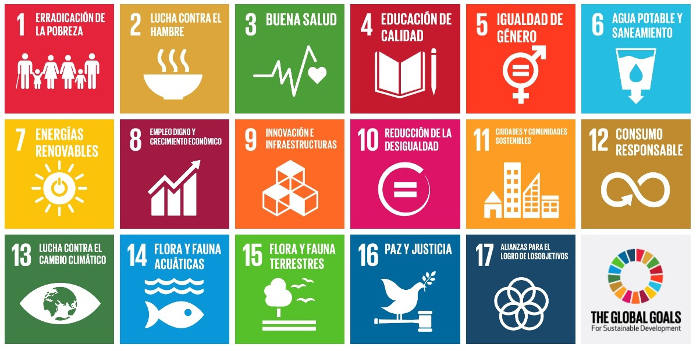-
30 January 2017
Category : Reportage
Seventeen commitments for a sustainable future
Eradicating poverty and hunger in the world, ending inequality and forming partnerships between countries for the common good are some of the goals established for a sustainable future.

In 2015, at the UN Sustainable Development Summit held in New York, 193 countries approved the agenda of goals for 2030. These new goals are the Sustainable Development Goals (SDG). The United Nations defines sustainable development as “development that meets the needs of the present without compromising the ability of future generations to meet their own needs”.
These goals are broader in scope than the eight Millennium Development Goals (MDG), signed in 2000, and involve more actors committed to eradicating poverty and fighting climate change.
On this occasion, the agenda calls for 17 goals to be achieved by 2030, including eradication of poverty and hunger in the world; elimination of gender disparity; caring for the planet as our only home by protecting the environment, biodiversity and combating climate change; and ensuring access to basic services like health care and education. A goal was also set that contemplates the creation of networks and partnerships between countries to work jointly to achieve the other goals.
EU commitment to the SDGs
The European Union has made a commitment to adopting the sustainable development goals and implementing them in Community legislation, prioritising its activities to address the three fundamental development pillars: economic, social and environmental.
It has also established, as one of the steps to be taken to achieve the 2030 agenda, the goal of creating a space for reflection on development with a longer-term perspective. Along these lines, it is also seeking to make the policies implemented in the European Union applicable beyond European borders by supporting third countries in the consolidation of peaceful, stable and resilient states.
The European Commissioner for International Cooperation and Development, Neven Mimica, expresses his commitment to achievement of the SDGs as follows: “I aim for a genuine consensus, under the shared ownership of EU Institutions and all Member States that will help us spearhead global action to implement the Sustainable Development Goals.”
FIIAPP in the 2030 Agenda
The International and Ibero-American Foundation for Administration and Public Policies (FIIAPP), as a public agency that manages international cooperation projects, works in accordance with the lines of action of European foreign policy.
Its work focuses on modernisation of the public institutions of the countries it works in through different areas. It has a direct relationship with the SDGs in the following ways:
– Social policies and rights: In this area, FIIAPP manages projects that contribute to the promotion and protection of basic social services like health care, education and employment. Here we find EUROsociAL, a programme to support social cohesion in Latin America through the exchange of experiences between experts on different subjects, such as justice, governance and public finance. This project contributes to the achievement of goal 16, “Promote peaceful and inclusive societies for sustainable development, provide access to justice for all and build effective, accountable and inclusive institutions at all levels”, and 17, “Strengthen the means of implementation and revitalize the global partnership for sustainable development”.
– Economy and public finance: In this area, FIIAPP implements projects to support countries in building sounder tax systems that will enable them to increase their national revenue, thereby strengthening the government. This is the objective of the Public Finance Modernization in Algeria project. These projects contribute to achievement of goal 17.1, “Strengthen domestic resource mobilization, including through international support to developing countries to improve domestic capacity for tax and other revenue collection”.
– Development and communication policies: In this area, FIIAPP focuses on supporting the governments of the countries where it works to improve the infrastructure, transport and construction sectors. Here we find the project FIIAPP is working on to support the railway system in Ukraine, which in its second phase aims to improve Ukraine’s rail transport system and adapt it to European regulations and standards. This project supports progress towards goal 11.2, “Provide access to safe, affordable, accessible and sustainable transport systems for all, improving road safety”.
– Green economy: The projects managed by FIIAPP in this area are governed by, among other regulations, the regulatory framework of the EU on climate and energy for 2030. This sector includes the Euroclima project to support climate change mitigation and adaptation policies designed to protect the environment in Latin America. This project is consistent with goal 13, “Take urgent action to combat climate change and its impacts”.
– Security and the fight against organised crime: In this aspect, FIIAPP works on projects to fight illegal immigration, human trafficking and drug trafficking. One example of this is the project to support drug legislation in Bolivia, in which Spanish security experts on drug issues work to train their Bolivian counterparts. The institutional support, in this sense, helps to achieve goal 16.4, “Significantly reduce illicit financial and arms flows, strengthen recovery and return of stolen assets, and combat all forms of organized crime”, and 16.11, “Strengthen relevant national institutions, including through international cooperation, for building capacity at all levels, in particular in developing countries, to prevent violence and combat terrorism and crime”.
– Justice and transparency: In this area, the projects managed by FIIAPP are focussed on fighting corruption and promoting transparency. Here we find the EUROMED Justice project, which aims to contribute to the development of an effective, efficient and democratic judicial system in the Euro-Mediterranean zone that will protect and respect human rights through regional cooperation (cooperation in which various countries in a region participate) in the areas of crime and access to justice. This project is consistent with goal 16, specifically with point 3, “Promote the rule of law at the national and international levels and ensure equal access to justice for all”.
The views and opinions expressed in this blog are the sole responsibility of the person who write them.






